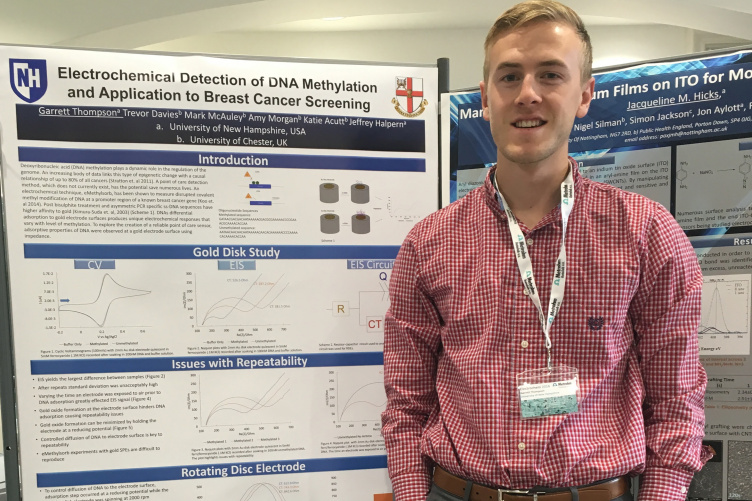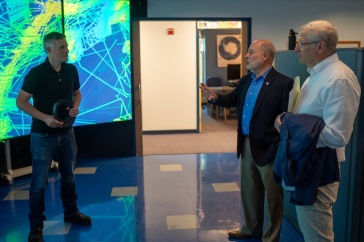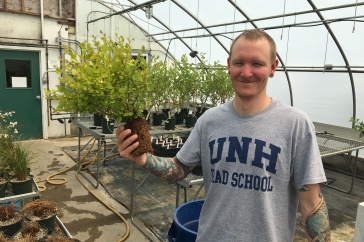
In this courtesy photo, Garrett Thompson '16 poses with his award-winning research.
Imagine a way to predict and detect cancer at the DNA level — allowing for treatment much earlier than current diagnostic methods.
In His Words
Thompson describes his award-winning research.
My work revolved around creating a biosensor that would aid in the diagnosis and prediction of breast cancer — as well as other cancers.
The traditional approach to breast cancer screening involves mammograms and physical screenings. These methods are not great at detecting the cancer early, which is crucial to effective treatment. The test that I was looking to develop involved screening people's DNA to determine if certain genes were "turned off."
I was essentially looking to develop a quick and easy test to detect mutations that cause cancer. These are not mutations in the traditional sense of having a gene sequence that is mutated but are mutations in that they affect a way a gene is read: If you think of a genome as a book, chromosomes would be the chapters, genes would be the sentences and the individual letters would be the DNA. A traditional mutation would change some of the words in each sentence — making it incomprehensible — but the mutations I was curious about would white out the whole sentence (gene) while leaving the actual words untouched.
To detect this, I used electrochemical methods. I was able to manipulate DNA so that mutated versions would bind at higher rates to an electrode surface. I was able to measure the amount of resistance (degrees of difficulty to pass electricity to solution) at the electrode surface. Since the mutated DNA bound to the electrode surface at higher rates, I would see a higher resistance. It was this difference in "resistance value" that allowed me to detect mutated versus normal DNA.
That is just what Garrett Thompson ’16 of Newmarket, New Hampshire, is hoping to uncover, and his research toward those ends — conducted through his International Research Opportunities Program (IROP) grant — has won him acclaim on the global stage.
This past summer, Thompson, who was one of seven IROP grant recipients for 2016, studied at the University of Chester in the UK and won the Analytical Methods poster prize at Electrochem 2016, the annual electrochemistry conference sponsored by the UK’s Royal Society of Chemistry.
Thompson, who is the founder of UNH's chapter of the American Society of Biochemistry and Molecular Biology, explains, “I was essentially looking to develop a quick and easy test to detect mutations that cause cancer.”
Thompson’s UNH mentor Jeffrey Halpern, assistant professor of chemical engineering, and professor Trevor Davies, his University of Chester mentor, agree the award is significant for Thompson and for both universities.
“The work he proposed for IROP is really top-notch. Garrett was in competition with doctoral students, post-docs and faculty, so this was quite an achievement,” Halpern notes, adding, “It’s very exciting.”
Thompson points to the support of both his mentors as a great help to his work.
Halpern, he says, “was instrumental in helping me apply for the grant and was very helpful in the editing process. He was able to come over to England and visit me while I was doing research as well as shadow me while I was conducting my experiments.” Davies “gave me a lot of guidance during the actual project itself. He was also able to show me a lot about England and the local area,” he adds.
Thompson says the IROP grant has opened many doors.
“My research experience at UNH pushed me to seek more opportunities to do similar research. I love exploring and meeting new people from diverse backgrounds, so an IROP was a perfect fit. I was able to complete meaningful research while still being able to travel and go on new adventures. My IROP experience has taught me a lot about the specific area that I research,” he explains, adding, “I have had multiple opportunities to present my work, which as sharpened my scientific communication skills.”
Thompson will be presenting his work at the 2016 AIChE Conference in San Francisco, California, this month.
Thompson also stays busy outside of the classroom and lab. He is an advanced EMT at Newmarket Fire and Rescue and enjoys outdoor adventures — having hiked most of the state’s 4,000-foot peaks and backpacked in the White Mountains. He is also involved in helping others succeed as a mentor with UNH’s Center for Academic Resources.
Donors Dana Hamel, Frank and Patricia Noonan and Samuel and Sarah Paul made Thompson’s IROP grant possible.

“I would like to thank the Hamel Center for Undergraduate Research for providing me with this wonderful and rewarding opportunity,” Thompson says, adding that the center provides exceptional resources “to get students involved with research” — from IROP and travel grants to SURF Abroad and REAP.
Halpern, who has sponsored two IROP students in his three years at UNH, agrees, noting, “The focus is on making sure excellent students get experiences they would not be able to have on campus.”
And, he adds, the students bring that expertise back to campus.
“It not only helps the students but the research projects here as well,” he says.
As for his plans after graduation in December, Thompson has applied for a Fulbright scholarship to return to England to pursue his master’s degree in public health.
“Eventually, I plan on attending medical school,” he says.
Want to learn more about the resources available through the Hamel Center for Undergraduate Research? Visit the center’s online home here.
-
Written By:
Jennifer Saunders | Communications and Public Affairs | jennifer.saunders@unh.edu | 603-862-3585



















































